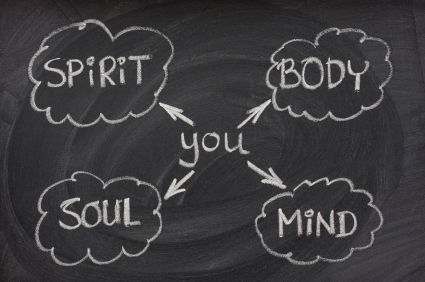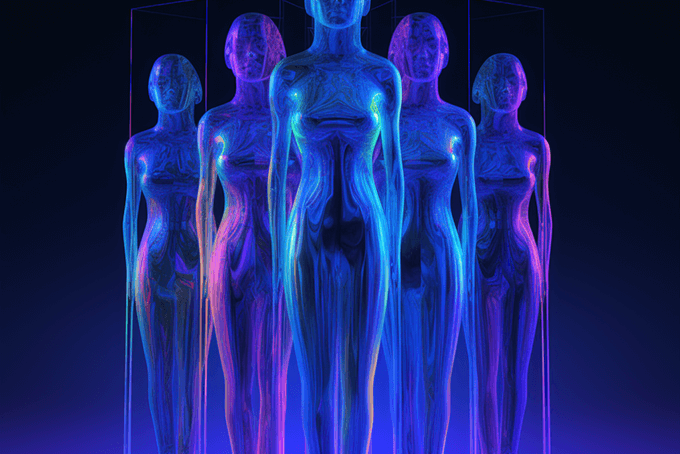“Which is most important,” Zen Master and legendary martial artist Sensei Hidy Ochiai asked the one-hundred black belt students at the end of a masters’ karate class, “mind, body, or spirit?” The anxiety in the room was palpable. Who would have the courage and confidence to raise a hand? There was a long pause, then, “Tell me your answer at our next class.” Whew! There was an audible sigh of relief.

Having read several book on Buddhism and Zen philosophy, I was pretty sure I knew the “correct” answer, but being only a first degree black belt at the time, I was also pretty sure it wouldn’t be appropriate martial arts protocol to raise my hand first. Sensei never brought up the question during our next class. Did he forget? Not a chance. It was his way of encouraging us to keep that question in our consciousness continuously so we would always be ready with our answer when or if he asked.
So, what’s the answer? Easy. “None and all.” Thinking about mind, body, and spirit as separate entities is nothing more than an intellectual construct. They are inseparable and interdependent dimensions of a whole human being. None of them separately is the most important, yet all of them together are essential to the development of a fully-functioning human being.
With the above as an introduction, I would like to join the discourse Bob Sullo began regarding the purpose of education. Sullo provides a brief history of education, referring to Education 1.0 as the informal education children received from their parents, older siblings, and members of their clan or tribe. Education 1.0 was primarily about survival and economy: what animals and plants to avoid, what to eat, how to find or make a shelter, how to hunt, gather, etc. Education 2.0 is when “education became formalized and was entrusted to professionals.” Education 2.0 is all about academics, with an emphasis on serving society – creating a skilled workforce, being contributing citizens, etc. Once again, economy is at the heart of Education 2.0. Rather than the economy of figuring out which hunter deserves the most meat, Education 2.0 is about individual job security and succeeding on an international and interdependent economic stage. But is education really “all about the economy, stupid?” I hope not. Below is my proposal for Education 3.0.
Education 3.0
For a moment, let’s return to Master Ochiai’s question. I’d like to pose it a different way, taking into account two other dimensions of being human that I believe are equally essential. “Which of the following is it most important to develop to become an educated person: the intellectual, the physical, the spiritual, the emotional, or the social being?” Before answering, let me define my terms:
Developing the Physical Being: This involves providing knowledge and skills relating to overall health, strength, fine and gross motor skills development, coordination, etc.
Developing the Intellectual Being: This involves providing knowledge and skills needed for developing memory; learning how to learn; critical thinking skills such as application, analysis, synthesis, and evaluation; mathematic, aesthetic, reading, and cultural literacy; and problem-solving, metacognition, and creativity.
Developing the Spiritual Being: This involves encouraging students to develop a sense of purpose or meaning in life; to connect to something greater than themselves, whether they call it God, Allah, Nature, Humankind, or Higher Power. It also includes the development of one’s personal energy, zest, or as the Chinese call it, “Chi.”
Developing the Emotional Being: This involves providing information and knowledge needed to be self-aware; to understand one’s emotions, to self-regulate, to restrain impulses and manage emotions, to increase self-efficacy, to set goals, create action plans, follow-through, and self-evaluate, to persevere, etc.
Developing the Social Being: This involves providing information and skills needed for building and maintaining positive relationships, getting along with others, and navigating the dynamic and complicated social networks that we all experience: awareness of others’ emotions, empathy, manners, contextual awareness, communication skills, etc.
Since the topic “the purpose of education” includes public education, I am going to omit spiritual development from the discussion. Spiritual development is the responsibility of the family. While some families seem to neglect this dimension, it is not the role of public education to address this extremely personal subject. As a teacher, I would encourage my students to develop this aspect of themselves, but I would never dare to prescribe how.
Let’s examine how a deficit in any dimension impacts the others. If you have ever been so physically exhausted that you can’t concentrate, you have experienced how the physical dimension can affect the intellectual. Similarly, being extremely tired and hungry can affect us emotionally, possibly making it more difficult to be patient or pleasant, which may well have a subsequent negative impact on the social dimension – our relationships with others.
A lack of intellectual development can make it more difficult to obtain a well-paying job and achieve financial security, which can impact our self-image (the emotional dimension), which in turn may make it more difficult to sustain satisfying relationships with others (the social dimension), and also make it difficult to do all the things (doctor’s appointments, exercise, proper nutrition, etc) necessary for physical wellness.
If our emotional dimension is not adequately developed, we may lack self-control, and/or self-discipline. This deficit will almost assuredly have a negative impact on our intellectual and academic success, which depend on our ability to attend, focus, delay gratification, persevere, learn, and achieve. Undeveloped or underdeveloped emotional skills – an inability to manage anger and stress, for example – also make it difficult to get along with others.
Finally, if there is a significant deficit in our social knowledge or skills, we may find it impossible to build and sustain satisfying relationships in our lives. In his book, Love and Survival, Dr. Dean Ornish examines research that points to a direct correlation between the quality of one’s social relationships and physical wellness.
A lack of positive trusting relationships is closely tied to heart disease (how ironic, or should I say “appropriate”?), clinical depression, and many stress-related auto-immune diseases. Since so much of learning has a social dimension (getting along with the teacher, cooperating and collaborating with peers, feeling accepted as a member of a learning community), it is clear that it has a significant impact on our intellectual dimension.
So, what’s my answer to what we need to make Education 3.0 successful? It is the same as the one I would have given to Master Ochiai. Each of the dimensions I have described are part of one thing. They can’t be separated except as mental constructs. They are all equally important and essential.
If I were to design Education 3.0, I would suggest a curriculum that not only focuses on the physical dimension, as we currently do through physical education, health, and extra-curricular sporting programs, and the intellectual dimension, which we currently address through academics, but also would include a comprehensive Pre-K – 12 emotional and social skills curriculum.
Through a more comprehensive approach to human development, we can shift from Education 2.0’s emphasis on society and our economy, to an emphasis on developing the whole individual: the physical, intellectual, and emotional selves within the framework of society. In so doing, we can provide all children with what they need – not only to survive or thrive economically or to be a contributing member of society – but also to reach their potential as fully-functioning, happy people.
